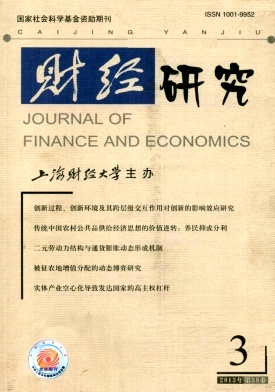中国居民家庭负债决策的群体差异比较研究
财经研究 2013 年 第 39 卷第 03 期, 页码:20 - 30
摘要
参考文献
摘要
居民家庭债务虽然能平滑消费,但过度负债会对宏观经济稳定产生负面影响,同时负债的群体间差异也可能造成居民家庭财富分布差距的扩大。为了研究中国居民家庭负债的群体间差异,文章根据负债规模将样本分为三组,采用Tobit模型分析了客观因素和主观感受对这三类家庭负债决策的影响方式和影响程度。研究发现只有较高负债规模家庭的家庭负债与家庭收入呈正相关关系,而在其他群体中收入并不是显著影响负债规模的因素;各样本家庭的家庭负债比例也有显著差异,导致负债比例差异的成因在不同家庭之间显著不同;此外,人口统计学特征、财务状况和主观态度对不同债务规模的家庭具有不同的影响方式。
[1]陈斌开,李涛.中国城镇居民家庭资产—负债现状与成因研究[J].经济研究,2011,(S1):55-66.
[2]何丽芬,吴卫星,徐芊.中国家庭负债状况、结构及其影响因素分析[J].华中师范大学学报,2012,(1):59-68.
[3]吴卫星,齐天翔.流动性、生命周期与投资组合相异性——中国投资者行为调查实证分析[J].经济研究,2007,(2):97-110.
[4]叶绮娜.美国家庭债务及其宏观经济效应研究[D].浙江大学,2012.
[5]Anderloni L,Vandone D.Risk of over-indebtedness and behavioural factors[R].Uni-versita degli Studi di Milano,Working Paper No.25,2010.
[6]Barba A,Pivetti M.Rising household debt:Its causes and macroeconomic implications-along-period analysis[J].Cambridge Journal of Economics,2009,33(1):113-137.
[7]Barnes S,Yong G.The rise in US household debt:Assessing its causes and sustainability[R].Bank of England,Working Paper No.206,2003.
[8]Campbell J R,Hercowitz Z.The role of collateralized household debt in macroeconomicstabilization[R].NBER Working Paper,No.11330,2005...
[9]Campbell J R,Hercowitz Z.Welfare implications of the transition to high household debt[J].Journal of Monetary Economics,2009,56(1):1-16.
[10]Cox P,Whitley J,Brierley P.Financial pressures in the UK household sector:Evidencefrom the British household panel survey[R].Bank of England,Quarterly Bulletin,2002,42(4):410-419.
[11]Crook J.The demand for household debt in the USA:Evidence from the 1995survey ofconsumer finance[J].Applied Financial Economics,2001,11(1):83-91.
[12]Crook J.The demand and supply of household debt:A cross country comparison[M].London:The MIT Press,2003.
[13]Crook J,Hochguertel S.Household debt and credit constraints:Comparative micro evi-dence from four OECD countries[R].University of Edinburgh,Working Paper SeriesNo.05,2007.
[14]Cynamon B Z,Fazzari S M.Household debt in the consumer age:Source of growth-riskof collapse[J].Capitalism and Society,2008,3(2).
[15]Debelle G.Macroeconomic implications of rising household debt[R].BIS WorkingPapers,No.153,2004.
[16]Dynan K E,Kohn D L.The rise in U.S.household indebtedness:Causes and conse-quences[R].FEDS Working Paper,No.37,2007.
[17]Fjaerli E.Tax reform and the demand for debt[J].International Tax and PublicFinance,2004,11(4):435-467.
[18]Hendershott P H,Pryce G.The sensitivity of homeowner leverage to the deductibilityof home mortgage interest[R].NBER Working Paper,No.11489,2005.
[19]Iacoviello M.Household debt and income inequality[J].Journal of Money,Credit andBanking,2008,40(5):929-965.
[20]Kennickell A B.Currents and undercurrents:Changes in the distribution of wealth,1989-2004[R].FEDS Working Paper,No.13,2006.
[21]Ling David C,Gary A McGill.Evidence on the demand for mortgage debt by owner-occupants[J].Journal of Urban Economics,1998,44(1):391-414.
[22]Lustig H N,Van Nieuwerburgh S G.Housing collateral,consumption insurance,andrisk premia:An empirical perspective[J].The Journal of Finance,2005,60(3):1167-1219.
[23]Rinaldi L,Sanchis-Arellano A.Household debt sustainability:What explains householdnon-performing loans?An empirical analysis[R].European Central Bank Working Pa-per,No.570,2006.
[24]Treeck T V.The macroeconomics of“financialisation”and the deeper origins of theworld economic crisis[R].Macroeconomic Policy Institute,Working Paper No.9,2009.
[2]何丽芬,吴卫星,徐芊.中国家庭负债状况、结构及其影响因素分析[J].华中师范大学学报,2012,(1):59-68.
[3]吴卫星,齐天翔.流动性、生命周期与投资组合相异性——中国投资者行为调查实证分析[J].经济研究,2007,(2):97-110.
[4]叶绮娜.美国家庭债务及其宏观经济效应研究[D].浙江大学,2012.
[5]Anderloni L,Vandone D.Risk of over-indebtedness and behavioural factors[R].Uni-versita degli Studi di Milano,Working Paper No.25,2010.
[6]Barba A,Pivetti M.Rising household debt:Its causes and macroeconomic implications-along-period analysis[J].Cambridge Journal of Economics,2009,33(1):113-137.
[7]Barnes S,Yong G.The rise in US household debt:Assessing its causes and sustainability[R].Bank of England,Working Paper No.206,2003.
[8]Campbell J R,Hercowitz Z.The role of collateralized household debt in macroeconomicstabilization[R].NBER Working Paper,No.11330,2005...
[9]Campbell J R,Hercowitz Z.Welfare implications of the transition to high household debt[J].Journal of Monetary Economics,2009,56(1):1-16.
[10]Cox P,Whitley J,Brierley P.Financial pressures in the UK household sector:Evidencefrom the British household panel survey[R].Bank of England,Quarterly Bulletin,2002,42(4):410-419.
[11]Crook J.The demand for household debt in the USA:Evidence from the 1995survey ofconsumer finance[J].Applied Financial Economics,2001,11(1):83-91.
[12]Crook J.The demand and supply of household debt:A cross country comparison[M].London:The MIT Press,2003.
[13]Crook J,Hochguertel S.Household debt and credit constraints:Comparative micro evi-dence from four OECD countries[R].University of Edinburgh,Working Paper SeriesNo.05,2007.
[14]Cynamon B Z,Fazzari S M.Household debt in the consumer age:Source of growth-riskof collapse[J].Capitalism and Society,2008,3(2).
[15]Debelle G.Macroeconomic implications of rising household debt[R].BIS WorkingPapers,No.153,2004.
[16]Dynan K E,Kohn D L.The rise in U.S.household indebtedness:Causes and conse-quences[R].FEDS Working Paper,No.37,2007.
[17]Fjaerli E.Tax reform and the demand for debt[J].International Tax and PublicFinance,2004,11(4):435-467.
[18]Hendershott P H,Pryce G.The sensitivity of homeowner leverage to the deductibilityof home mortgage interest[R].NBER Working Paper,No.11489,2005.
[19]Iacoviello M.Household debt and income inequality[J].Journal of Money,Credit andBanking,2008,40(5):929-965.
[20]Kennickell A B.Currents and undercurrents:Changes in the distribution of wealth,1989-2004[R].FEDS Working Paper,No.13,2006.
[21]Ling David C,Gary A McGill.Evidence on the demand for mortgage debt by owner-occupants[J].Journal of Urban Economics,1998,44(1):391-414.
[22]Lustig H N,Van Nieuwerburgh S G.Housing collateral,consumption insurance,andrisk premia:An empirical perspective[J].The Journal of Finance,2005,60(3):1167-1219.
[23]Rinaldi L,Sanchis-Arellano A.Household debt sustainability:What explains householdnon-performing loans?An empirical analysis[R].European Central Bank Working Pa-per,No.570,2006.
[24]Treeck T V.The macroeconomics of“financialisation”and the deeper origins of theworld economic crisis[R].Macroeconomic Policy Institute,Working Paper No.9,2009.
引用本文
吴卫星, 徐芊, 白晓辉. 中国居民家庭负债决策的群体差异比较研究[J]. 财经研究, 2013, 39(3): 20–30.
导出参考文献,格式为:





 8582
8582  5057
5057

